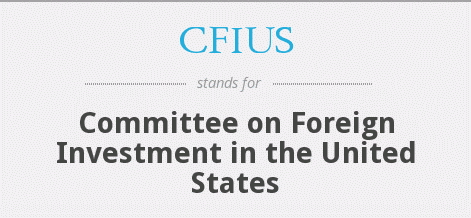
The Treasury Department on Jan. 13 issued two final regulations that increase the U.S. executive branch’s ability to address national security concerns arising from certain foreign investments, including real estate transactions. (Treasury’s full text of the final regulations & related resources)
- The new rules, which go into effect Feb. 13, will comprehensively implement the Foreign Investment Risk Review Modernization Act of 2018 (FIRRMA). The Act authorizes the Committee on Foreign Investment in the United States (CFIUS) to review certain transactions involving foreign investment to determine potential effects on U.S. national security.
- FIRRMA, enacted with bipartisan support in August 2018, established CFIUS’ jurisdiction over certain real estate transactions. It also broadened CFIUS’ jurisdiction over certain non-controlling investments into certain U.S. businesses involved in critical technology, critical infrastructure, or sensitive personal data.
- The new regulations were released in two parts: Provisions Pertaining to Certain Investments in the United States by Foreign Persons (31 C.F.R. part 800); and Provisions Pertaining to Certain Transactions by Foreign Persons Involving Real Estate in the United States (31 C.F.R. part 802). (Skadden, Jan. 16 – “CFIUS’ Final Rules: Broader Reach, Narrow Exceptions and Foretelling Future Change“)
- “These regulations strengthen our national security and modernize the investment review process,” said Treasury Secretary Steven T. Mnuchin. “They also maintain our nation’s open investment policy by encouraging investment in American businesses and workers, and by providing clarity and certainty regarding the types of transactions that are covered.” (Treasury statement, Jan. 13)
- The new rules create exemptions to CFIUS jurisdiction for so-called “excepted foreign states” that include nationals, entities, and governments of certain countries. The current list of eligible foreign states includes Australia, Canada and the United Kingdom, but may expand to include other nations in the future.
- The Real Estate Roundtable submitted comments to Treasury last year about the original, proposed CFIUS rules and requested clarifications about how investments in commercial real estate would be affected. (Roundtable Weekly, Sept. 20, 2019 and Roundtable Letter, Oct. 17, 2019)
- FIRRMA expands the list of covered transactions to include some foreign purchases and leases of real estate near military and other strategic facilities. Responding to concerns raised by The Roundtable and other industry groups, language is included in the rules that exempts real estate located in an ‘urbanized area’ from the criteria of a covered transaction. The Census defines an urbanized area as one comprising more than 50,000 people.
- The new rules include other modifications to the proposed rules affecting real estate transactions. The final rules lower the threshold for investors to qualify as “excepted investors.” A foreign person who now qualifies as an excepted investor will not be subject to CFIUS’ jurisdiction for non-controlling investments regarding real estate transactions. (Law 360, Jan. 15)
- A Ropes & Gray Jan. 15 summary – “CFIUS Issues Final Rules Implementing FIRRMA: Key Changes and Developments” – reports that an entity may be deemed an “excepted investor” if, among other requirements:
- 75 percent or more of the members and 75 percent or more of the observers of the board of directors (or comparable body) are citizens of either the United States or an excepted foreign state – instead of the 100 percent requirement articulated in the Proposed Rules, and
- All investors that hold a 10 percent or greater equity interest are citizens of either the United States or an excepted foreign state – instead of the 5 percent or greater requirement set forth in the Proposed Rules.
According to a Jan. 16 JD Supra report — “Key Takeaways from CFIUS Final Rules Implementing FIRRMA — the final rules also broaden the covered real estate exception for retail trade, accommodation, and food service stores. The new rules apply the exception to leases and concessions of real estate that are “used only for the purpose of engaging in the retail sale of consumer goods or services to the public.”
CFIUS also intends to make a web-based tool available in the near term to assist the public with assessing what qualify as “covered real estate transactions” that are potentially subject to CFIUS review.
With these final rules, investors and companies now face a more complicated CFIUS framework that accounts for evolving national security risks involving foreign investments and real estate transactions.
The Roundtable’s Real Estate Capital Policy Advisory Committee (RECPAC) and Homeland Security Task Force (HSTF) plan to study the 132-page rule (part 802) affecting foreign transactions in U.S. real estate for more insight into how the new rules may impact commercial real estate investment.
# # #

